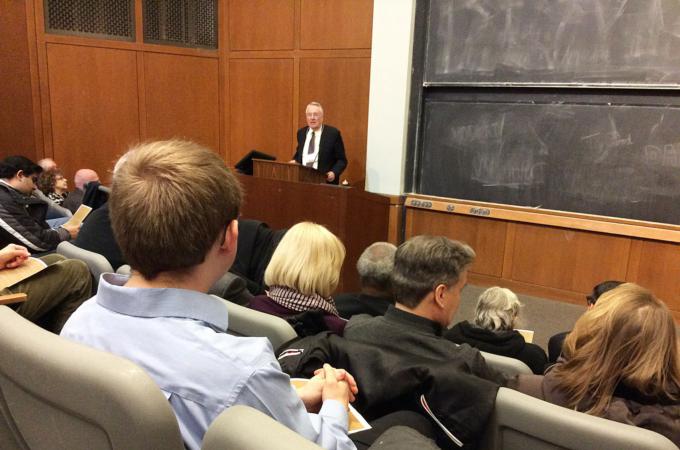B.C. hosts inaugural Helmick Memorial Lecture on peace
CHESTNUT HILL -- An inaugural memorial lecture in honor of the late Father Raymond G. Helmick, S.J., respected theologian internationally regarded for his conflict resolution skills, took place Dec. 11 at Boston College.
Well over 100 people came to hear Georgetown University professor David Little address "Religion and Conflict Transformation." Professor Little is a research fellow at Georgetown's Berkley Center for Religion, Peace, and International Affairs, and a leading authority on the history of religious freedom, ethics and human rights, and religion and conflict resolution.
The lecture was the work of a Memorial Committee: Stephen D. and Marie Helmick Barry; Raymond Barry; Jennifer Helmick; Professors John and Susan Mihalczyk; attorney Jerome Maryon; and Dr. Rodney Peterson, executive director of the Cooperative Metropolitan Ministries (CMM), and the Lord's Day Alliance of the U.S.
The afternoon program began with an opening prayer by Rabbi Sandy Seltzer. The audience included clergy, former students who considered Father Helmick a mentor, and members of Catholic, Christian, Jewish and Muslim faith traditions.
In opening remarks Raymond Barry, Father Helmick's nephew, spoke about going through and organizing over 40 boxes of his uncle's papers and documents -- an enormous and still unfinished task -- which has given him greater understanding of the scope of his uncle's work.
The papers will be housed at Bapst Library at Boston College.
Filmmaker and Art, Art History, and Film Studies Department Professor John Michalczyk, cited Father Helmick's work in the areas of peace and reconciliation, climate change, human rights, and the freeing of prisoners.
"Father Helmick has left his imprint on our planet," he said.
Professor Michalczyk worked with Father Helmick on 10 films dealing with international conflict resolution in Northern Ireland, the Mideast, and Balkans.
"For many of us who consider him our mentor, he has left us with the important insight that we must see that there are two historical sides to a narrative and hence we must not demonize the enemy, but welcome him or her into dialogue," Michalczyk said.
Professor Little said that Father Helmick was, "in no way a helicopter peacemaker. He didn't pop in and out. He familiarized himself with immediate and local details. Ray's practice-based theory of peacemaking was based on saving the proposition of the other."
This very Jesuit approach to conflict resolution comes from Saint Ignatius' Presupposition: "let it be presupposed that every good Christian is to be more ready to save his neighbor's proposition than to condemn it. If he cannot save it, let him inquire how he means it; and if he means it badly, let him correct him with charity." (SE 22)
Professor Little noted that Father Helmick's method was to, "always begin discussion by attempting to understand, as much as you can, the argument of the other."
Before opening the floor to questions, Maryon told the audience, "David Little threw challenges to you. We have a deep need for reconciliation," adding that the work of peacemaking is everyone's task.
Before leading the closing prayer, Father Walter Conlan, S.J., added a light note in reference to Raymond Barry's comment about Father Helmick's mountains of documents, saying that none of the other Jesuits wanted to have the room directly under Father Ray, for fear that the ceiling would collapse.
The closing prayer included a simple and direct plea to God, "Bring peace and justice to the world; teach us all to be peacemakers."
The next lecture in the series will be at Boston College on April 22, the first anniversary of Father Helmick's death. The speaker will be his long-time friend, the Rev. Jesse Jackson.



















